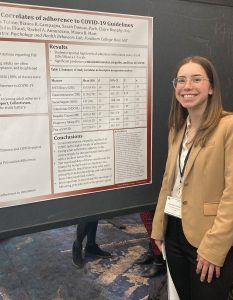The idea for the study emerged in fall 2020. Fordham had reopened its campuses after its University-wide pivot to virtual instruction the previous March, and was requiring masks as well as other precautions to contain the coronavirus. Universities everywhere were doing similar things, hoping to avoid COVID-19 spikes that would force them to once again shift to completely remote education.
When this shift didn’t need to happen that fall at Fordham, students sighed with relief. And a student-faculty cohort in the psychology department grew curious.
“As a group that studies health behaviors especially among young adults, we were fascinated by this,” said Rachel Annunziato, Ph.D., associate dean for strategic initiatives and professor of psychology at Fordham College at Rose Hill. “I thought, ‘There’s probably something special about Fordham students that’s contributing.’”
She and her student researchers in the Pediatric Psychology and Health Behaviors lab prepared a survey that was completed by 92 students before the planned closure after Thanksgiving break. It asked about their level of compliance with masking and other measures to contain the coronavirus. It also measured motivators including empathy and concern for the collective good, which dovetail with the Jesuit identity of the University.
 Maura Mast, Ph.D., dean of Fordham College at Rose Hill, was a senior author of the study, titled “Students for others: Correlates of adherence to COVID-19 guidelines.” The title reflects a key precept of Jesuit education that is constantly reinforced, noted one of the student co-authors, Kristina Stevanovic, FCRH ’22.
Maura Mast, Ph.D., dean of Fordham College at Rose Hill, was a senior author of the study, titled “Students for others: Correlates of adherence to COVID-19 guidelines.” The title reflects a key precept of Jesuit education that is constantly reinforced, noted one of the student co-authors, Kristina Stevanovic, FCRH ’22.
“From the second you arrive on campus, [Joseph M. McShane, S.J., now president emeritus of Fordham] talked about being men and women for others, and any Fordham event you attend where they’re talking about Jesuit values, it’s men and women for others,” she said. “Maybe it just is the fact that we hear it over and over again.”
Promoting Health Awareness in the Young
The study, published in July in the Journal of American College Health, is one of many to grapple with the question of how to get adolescents and young adults to take health precautions seriously, even though they’re more likely to take risks and may find it hard to make a behavior change if their peers aren’t doing the same thing.
A lot of the work in Annunziato’s lab centers on young people’s adherence to medication regimens after receiving liver transplants, so focusing on coronavirus precautions “felt like a natural shift,” said another coauthor, Rebecca Tutino, a doctoral student in clinical psychology at Fordham. She also noted that the topic was close to home for the student researchers.
“We [were]all students ourselves going through the same lived experience as everyone else who took part in this study.”
Students’ health behaviors weighed heavily on leaders as universities everywhere grappled with how to approach the fall 2020 semester, the study says. Out of 3,000 institutions surveyed by the Chronicle of Higher Education about their reopening modes, the study notes, 34% offered courses primarily online, 23% were primarily in-person, and 21% were in hybrid mode. Only 10% were fully online.
Fordham took a blended approach—after shifting to remote education in March 2020 following the pandemic’s outbreak, the University offered hybrid courses in fall 2020 and gave students the option of taking all their classes online. Residence halls opened, and masks, social distancing, and other precautions were required. If COVID cases had totaled 5% of the on-campus population, Fordham would have had to return to fully remote learning for two weeks, per New York state policy.
Rates stayed low and stable through Thanksgiving break, after which Fordham pivoted to remote learning for the remnant of the semester, as it had planned to do since the prior summer. The low COVID rates were a nice surprise, Tutino said—“We were like, what is going on here? What is it about our student body that is allowing for this to happen?”
Their study offers some insight.
Survey Results
Students completed a web-based Qualtrics survey during the month leading up to Thanksgiving break in 2020. The results showed students were largely following the rules—for instance, more than 90% were washing their hands and wearing masks both inside and outside, either all or most of the time. More than 90% were mostly abiding by travel restrictions, and nearly 70% were practicing social distancing all or most of the time.

Their reasons for complying were the key finding, Annunziato said. A less-prominent reason was social support, or feeling like one’s peers support your actions—usually a strong predictor of health-related behaviors. Also less prominent was self-efficacy, or one’s sense of personal control over an outcome or circumstance.
Instead, students’ behaviors were more driven by empathy, fear of COVID, taking others’ perspective, and a sense of collective benefit. Stevanovic noted the interrelations between these reasons—“If you’re able to put yourself in somebody else’s shoes, I think you’re a little bit more likely, then, to have a collectivist attitude, and espouse greater empathy,” she said. “I can just clearly see how those constructs end up relating and being correlated to one another.”
Tutino said the findings line up with what she saw among students in her program—respecting other people’s boundaries, taking care to sit far enough apart in class, or perhaps opening windows to make everyone feel comfortable and safe, she said.
The study notes some possible limitations: for instance, most respondents were women, and they held more liberal political views. And they had chosen to attend a Jesuit university that embraces certain values.
Future Directions
But the study still offers useful insights, Annunziato said. “In my field of pediatric psychology, I’ve talked to a lot of folks who are intrigued by this,” she said. “We really struggle in terms of developing interventions that are meant to cultivate or bolster health behaviors. I think there’s excitement that the Fordham experience has helped to maybe fill in some missing pieces when it comes to motivators of young adults.”
The findings show that empathy and collectivism could have bearing on other health behaviors such as underage drinking or getting vaccinated, the study says.
Stevanovic presented the research in March 2022 at the Eastern Psychological Association Conference in New York City, where she saw a lot of research projects related to COVID. Because of this experience, “I think I really just want to study health behaviors, ultimately, and population health,” said Stevanovic, who is now a clinical research coordinator in psychiatry and behavioral sciences at Memorial Sloan Kettering Cancer Center.
Tutino noted that “we got so many responses right away” after posting the study’s questionnaire.
“To see such a high response rate and to have people sending the links to each other and sharing it without us even having to ask, that was really wonderful,” she said. “I feel like all of us were thinking, ‘Why aren’t we doing this more?’ This is a population that’s happy to help us with our research, and we can really learn so much from them.”
